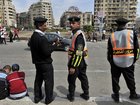The day he was sworn in as Egypt's first civilian president in June 2012, Mohammed Morsi told a cheering crowd in Cairo's Tahrir Square he would be a "president for all Egyptians".
But one year later, the country is deeply divided.
 Full Story
Full Story
Islamist President Mohamed Morsi warned on Wednesday that political divisions in Egypt "threaten to paralyze" the country, as at least one person was killed and scores were hurt in clashes between his supporters and opponents.
In a televised speech to mark his turbulent first year in power, "Egypt faces many challenges. The polarization has reached a stage that could threaten our democratic experience and paralyze the nation."
 Full Story
Full Story
At least one person was killed and 237 were hurt in clashes between supporters and opponents of Mohamed Morsi Wednesday, the health ministry said, as Egypt's Islamist president prepared to address the nation on his first year in power.
Islamists had been holding a pro-Morsi rally in the Nile Delta city of Mansura when opponents began throwing rubbish at them and fighting erupted, a security official said.
 Full Story
Full Story
Egypt's public prosecutor on Wednesday referred nine people, including six foreigners, to trial for allegedly spying for Israel, the official MENA news agency reported.
Three Egyptians and six Israelis were referred to a criminal court, though it was unclear if any of them were in the country.
 Full Story
Full Story
Hizbullah on Tuesday stressed that it has “nothing to do at all” with the issue of helping inmates escape from an Egyptian prison in 2011, although it acknowledged that its official Sami Shehab was among those who made their way out.
Commenting on an Egyptian court's verdict that said Hizbullah and Hamas helped prisoners, including current President Mohamed Morsi, escape from the Wadi Natrun prison during the 2011 uprising, Hizbullah stressed that it had “nothing to do at all with the incidents that led to liberating prisoners from the Wadi Natrun prison … who included our jihadist brother Sami Shehab.”
 Full Story
Full Story
U.S. Secretary of State John Kerry on Tuesday urged all sides in Egypt to ensure that protests this weekend will not be violent and instead bring about "positive change" in the polarized country.
Kerry, who discussed Egypt's chaotic politics with Saudi leaders during a visit to the regional power, said demonstrations were a "very legitimate" way of expression amid fears that authorities will clamp down.
 Full Story
Full Story
Security forces have arrested eight people in connection with the brutal killing of four Egyptian Shiites in a village south of Cairo, officials said on Tuesday.
"Security efforts have been increased to find the rest of the perpetrators after they fled their homes," a security official told the national MENA news agency.
 Full Story
Full Story
Iran on Tuesday condemned an attack against Shiites in a village south of Cairo which left four dead and several injured, saying it is part of a "foreign conspiracy."
"Iran condemns the killing of a Shiite leader and three other Egyptian Shiite Muslims," foreign ministry spokesman Abbas Araqchi told reporters during his weekly news conference.
 Full Story
Full Story
A coalition of Egyptian Islamist parties on Monday called for an "open-ended" demonstration on Friday in support of President Mohamed Morsi two days before planned rallies against him, raising fears of violence.
The alliance is calling for a "million-man march" followed by an open-ended protest outside the Rabaa al-Adawiya mosque in Egypt's Nasr City under the slogan "legitimacy is a red line", Morsi's Freedom and Justice Party said in a statement on its website.
 Full Story
Full Story
Egypt's prime minister, Hesham Qandil, on Monday condemned the "heinous" attack against Shiites in a village south of Cairo which left four dead and several injured, the cabinet said in a statement.
Qandil "strongly condemns the ugly incident ... which resulted in the death of four Egyptian citizens," the cabinet said.
 Full Story
Full Story



